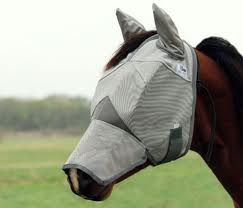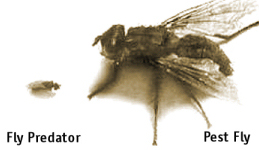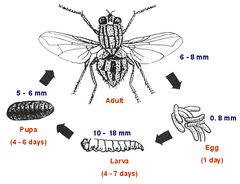|
Fly ControlFly control should be initiated in late spring or late fall. Weather that is hot and dry or cold and wet produces fewer flies. Warm, wet weather means more flies. Cool, wet weather will delay fly life cycles. Adult flies live for about two to three weeks in warmer weather and longer during cooler weather. Stable flies develop so rapidly that they can complete several generations each summer.
1.natural pyrethrins (usually with the synergist piperonyl butoxide), which are derived from plants.
2.synthetic chemical formulations that often include pyrethrins. Those that use natural pyrethrins may give nearly 100 percent repellency for hours. Some combination products may claim to work for several days or more after applying them to the horse.

Fly repellents used on horses may be oil-based, alcohol-based, or water-based. Most are available either in ready-to-use or concentrated form. Roll-on repellents are available for use on the horse's face and near open wounds. Repellent ointments keep flies away from cuts and other injuries as well. Some the repellents on the market also contain sunscreen and aloe, lanolin, and other emollients to condition and moisturize the skin and coat. Sunscreen fly repellents will help to prevent sunburn on horses with mostly white heads. Fly sheets are good for body coverage, but they don't protect the forelegs from biting flies. Fly masks provide excellent nonchemical fly control for a horse's face and ears but need to be removed at night.

Fly Predators are gnat-sized insects which do not bite, or sting humans and animals. Adaptable to all climates, they reproduce in one to two weeks. The fly predators are the naturally occurring enemy of manure breeding pest flies. These tiny insect predators serve as a major check of fly populations by destroying flies in the immature maggot and pupa stages. Fly predators are specific to flies, never attacking anything else, these tiny wasps have absolutely no effect on horses or humans. Fly predators are a great alternative to chemical insecticides. This is a very simple product to use, just simply sprinkle Fly Predators near manure and in the corners of horse stalls. Most users of this fly control method report a dramatic reduction of the fly population on their farms. Return from Fly-Control to Horse Riding Connection
|
 Numerous repellent sprays, wipe-ons, roll-ons, salves, lotions, and slow release insecticidal devices are available for on-horse fly control. There are many brands of fly repellents, but basically they can be divided into those containing:
Numerous repellent sprays, wipe-ons, roll-ons, salves, lotions, and slow release insecticidal devices are available for on-horse fly control. There are many brands of fly repellents, but basically they can be divided into those containing: 
